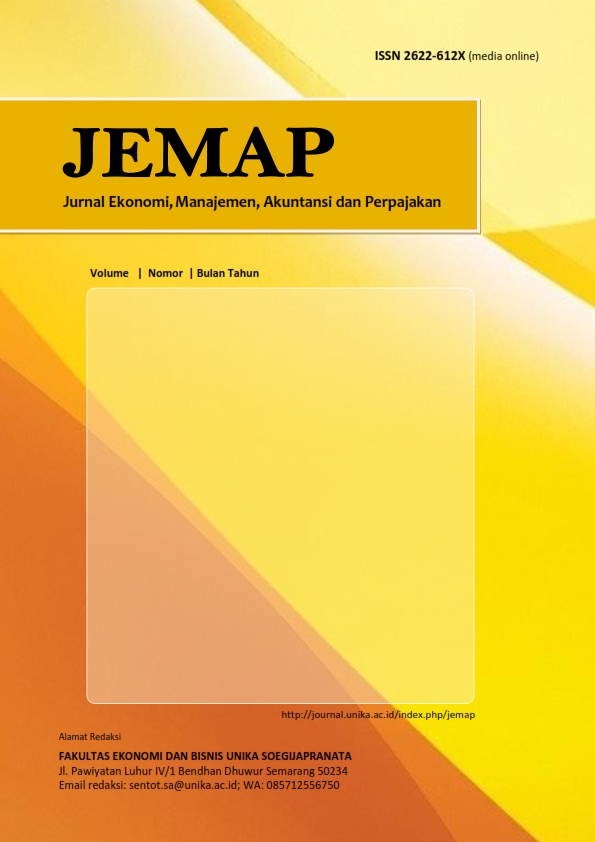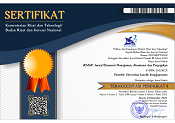Kompetensi Lintas Budaya Guru-Guru Ekspatriat di Kota Semarang
Abstract
This study was adescriptive-phenomenological analysis thataimed to describe the profile and cross-cultural competence expatriate teachers in Semarang.The study was conducted in five schools those were intentionally chosen for the reason that those schools employed expatriate teachers since the beginning of the program.
The study used a set of questionnaire and an interview guide. Respondents of the study were 23(twenty three) expatriate teachers those were selected through snowball technique during a short study.
The study found that expatriate teachers working inthe five selected schools were the professional teachers. This finding was evidenced by theteacher's certificate obtained from their home country that has been endorsed by the education attaché at the Indonesian embassy in their country. In the context ofcross-cultural competence, the study found that cross-cultural competence of expatriate teachers was categorized intothe moderate category.
Keywords
Full Text:
PDFReferences
Armstrong, M. (2010). Armstrong’s Essential Human Resource Management Practice: A Guide To People Management. London: Kogan Page.
Ananda, D. R., & Prasetya, A. (2016). Analisis implementasi gaya kepemimpinan lintas budaya ekspatriat Korea Selatan (Studi pada PT. Krakatau Daedong Machinery, Cilegon-Banten). Jurnal Administrasi Bisnis, 41(1), 43-50.
Beuckelaer, A.D., Lievens, F., & Bucker, J. (2012). ‘The Role of Faculty Members’ Cross-Cultural Competencies in Their Perceived Teaching Quality: Evidence from Culturally-Diverse Classes in Four European Countries’. The Journal of Higher Education, Vol. 83 (2): 217-248.
Briscoe, D.R., & Schuler, R.S. (2004). International Human Resource Management: Policy and practice for the global enterprise, edisi kedua. New York: Routledge.
Campinha-Bacote, J. (2002). ‘The Process of Cultural Competence in the Delivery of Healthcare Services: A Model of Care’, Journal of Transcultural Nursing, Vol. 13 (3): 181-184.
Deardorff, D.K.(2009). ‘Synthesizing Conceptualizations of Intercultural Competence: A Summary and Emerging Themes’, dalam Deardorff, D.K (editor) ‘The Sage Handbook of Intercultural Competence’.
---------- (2011). ‘Assessing Intercultural Competence’, New Directions for Institutional Research, no. 149 (Spring): 65-79.
Fantini, Alvino E. (2009). ‘Assesing Intercultural Competence: Issues and Tools’, dalam Deardorff, D.K (editor) ‘The Sage Handbook of Intercultural Competence’.
Hampden-Turner, C.H., & Trompenaars, A. (2000).Building Cross-Cultural Competence: How to Create Wealth from Conflicting Values. Chichester: John Wiley and Sons.
Harzing, A. (2004). “Composing an International Staff”, dalam Harzing & Ruysseveldt (eds), International Human Resource Management, London: SAGE Publications.
Hellriegel, D., & Slocum, Jr. J.W. (2009). Organizational Behavior, edisi keduabelas. Mason – OH: Southwest Cengage Learning.
Jati, L. S. (2015). Analisis pengaruh gaya kepemimpinan ekspatriat terhadap komunikasi lintas budaya dan job satisfaction karyawan (Studi kasus gaya kepemimpinan ekspatriat di PT. Central Motor Wheel Indonesia). Jurnal Administrasi Bisnis, 25(2).
Luthfiyah, U. Z. (2016). Hambatan komunikasi antar budaya dalam penerjemahan di perusahaan modal asing Jepang. The Messenger, 8(1), 46-50.
Manning, C., & Aswicahyono, H. (2012). Perdagangan di Bidang Jasa dan Ketenagakerjaan: Kasus Indonesia. Jakarta: Kantor Perburuhan Internasional (ILO).
Mathis, R., & Harold, J. (2000). Human Resource Management, edisi kesembilan. Ohio: South-Western College.
Nawawi, N. (2017). ASEAN-CHINA FREE TRADE AGREEMENT (ACFTA) dan realitas kesiapan sumber daya manusia Indonesia. Masyarakat Indonesia, 36(2), 25-47.
Ramalu, S.S., Rose, R.C., Uli, J., & Kumar, N. (2012). ‘Cultural Intelligence and Expatriate Performance in Global Assignment: The Mediating Role of Adjustment’. International Journal of Business Society, Vol. 12 (1): 19-32.
Rose, R.C., Ramalu, S.S., Uli, J., & Kumar, N. (2010). ‘Expatriate Performance in International Assignments: The Role of Cultural Intelligence as Dynamics Cultural Competency”, International Journal of Business and Management, Vol. 5 (8): 76-85.
Ruky, A. (2017). Permasalahan Tenaga Kerja Asing di Indonesia. Naskah ini diunduh dari: https://achmadruky.com/430/permasalahan-tenaga-kerja-asing-di-indonesia pada tanggal 28/6/2017
Sari, L., & Unde, A. A. (2016). Perilaku komunikasi karyawan ekspatriat China terhadap mitra lokal dalam bisnis telekomunikasi di Sulawesi Selatan. Kareba: Jurnal Ilmu Komunikasi, 2(3), 223-232.
Wright, P.M., &McMahan, G.C. (2011). ‘Exploring human capital: putting human back into strategic human resource management’. Human Resource Management Journal, 21 (2): 93–104.
http://databoks.katadata.co.id/datapublish/2016/12/30/tenaga-kerja-asing-terbanyak-pada-pemerintahan-sby
http://www.hukumonline.com/klinik/detail/lt557fb3beea80c/syarat-tenaga-kerja-asing-bisa-bekerja-di-indonesia#_ftn2
DOI: https://doi.org/10.24167/jemap.v1i2.1860
Refbacks
- There are currently no refbacks.
e-ISSN 2622-612X | View My Stats







